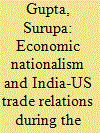|
|
|
Sort Order |
|
|
|
Items / Page
|
|
|
|
|
|
|
| Srl | Item |
| 1 |
ID:
189436


|
|
|
|
|
| Summary/Abstract |
While India and the United States’ relations on the strategic and political fronts improved during 2017–2020, trade relations between the two countries noticeably worsened. Ever since their relations began to improve in the 1990s, deep divisions have existed between the two on trade issues such as market access in goods and services, intellectual property rights, and industrial policy. Given the focus on their strategic relations, successive administrations sought to manage these economic differences without public escalation of conflicts. The Trump administration’s approach deviated from this practice. While it continued to use the multilateral trading system to resolve some conflicts, it also resorted to using public shaming, tariff escalations and withdrawal of concessions in its relations with India. Although the Modi administration’s trade policy was similarly nationalist, its response to US actions were cautious. Evidence from the Modi-Trump period (2017–2020) shows that while both nationalist leaders pursued protectionist policies, the power capabilities of the states they led and the level of mutual economic dependence shaped their actions, their choice of instruments, and their ability to compel change in the other’s policies.
|
|
|
|
|
|
|
|
|
|
|
|
|
|
|
|
| 2 |
ID:
164639


|
|
|
|
|
| Summary/Abstract |
This forum comes from a 2016 panel at the annual meeting of the International Studies Association. The forum participants offered mid-term assessments of the foreign policy of Indian Prime Minister Narendra Modi. This forum considers whether Modi heralded in a new era in Indian foreign policy, or whether Modi's policies just repackaged older policies. The authors in this forum answer these questions by focusing on a range of issues from the role of religion to economic issues, to the relations between India and major foreign partners. The authors conclude that while Modi has undeniably put a personal stamp on foreign policy, substantive changes have been minimal. The first significant change lies in the centralization of foreign policy decision-making in the Prime Minister's Office. Second, while religious diplomacy played an important role, the version of Hinduism that Modi has adopted in foreign affairs is more inclusive than the one on display in domestic politics. Third, India's foreign economic policy has adopted a distinct nationalist tone. Fourth, Modi has signaled a “neighborhood first” focus in foreign policy. Finally, despite attempts at imparting his personal stamp, India's foreign policy towards major partners and in most issue areas remains substantively similar to those of the previous administrations.
|
|
|
|
|
|
|
|
|
|
|
|
|
|
|
|
| 3 |
ID:
185097


|
|
|
|
|
| Summary/Abstract |
How do rising powers engage with international institutions? While this question has remained important, we have very few theoretically grounded, empirical studies that look at this engagement. This paper seeks to address that gap by focusing on India's engagement with the International Monetary Fund (IMF). It argues that rising powers engage with the institution's distinctive design, seeking to change features such as the rules for controlling the institution. The issues the institution covers matter: the nature of the issue area can facilitate engagement. For example, in the case of India's engagement with the IMF, the technical nature of the issue arena provided autonomy to the executive and facilitated the process of formulating and implementing its strategy. The Indian executive has engaged mostly with formal rules during the period under review. Contrary to expectations that status-quoist institutions will normally discourage states from seeking change, the paper finds that India expended its resources to influence quota reform.
|
|
|
|
|
|
|
|
|
|
|
|
|
|
|
|
|
|
|
|
|